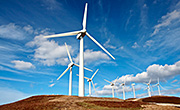
German Renewable Energy Act—Changes in 2014
The amended German Renewable Energy Act ("REA") takes effect on August 1, 2014 and will cause significant changes to Germany's renewable energy landscape, including increased electric generation production targets from renewable energy sources, increased plant capacity, replacement of feed-in tariffs for a market premium system, and the implementation of a surcharge to aid utilities.
Target
The REA extends the targets for the generation of electric power from renewable energy sources so that the share of the energy generated from renewable energy sources increases from 40 to 45 percent until 2025, from 55 to 60 percent until 2035, and to 80 percent until 2050.
The photovoltaic plant capacity should increase by 2,500 megawatts ("MW") (target corridor between 2,400 MW and 2,600 MW, "Target Corridor") per year. The Federal Network Agency (Bundesnetzagentur) will establish a renewable energy power plant register in order to register all plants and will monitor the increase.
Direct Marketing
Currently, operators of photovoltaic plants, for example, receive a statutory feed-in tariff of 13.5 cents per kilowatts per hour ("KW/h"). This fixed tariff will be replaced by a direct marketing system. From August 1, 2014, the owners and operators of renewable energy power plants with an output of more than 500 kilowatt peak ("kWp") (100 kWp starting in 2016) will be obliged to directly market the energy generated by their plants. They have the choice between independent direct marketing or via a direct marketer.
The direct marketing is supported by a so-called market premium ("Market Premium") that must be paid by a direct marketer in addition to the agreed feed-in remuneration for the energy generated if (i) the energy generated is subject to direct marketing, and (ii) the energy is generated from renewable energy sources. The Market Premium is the difference between a hypothetical feed-in tariff for photovoltaic plants and the average price for energy generated by photovoltaic plants at the European Power Exchange ("EPEX Spot SE") in Paris for the Germany–Austria area per kW/h, and it will be calculated each month. The hypothetical feed-in tariff will be 9.23 cents per kW/h as of August 1, 2014, and will decrease by 0.5 percent per month starting as of September 1, 2014, as long as the increase of energy generated by photovoltaic plants lies within the Target Corridor. If the increase of electric power generated by photovoltaic plants does not lie within the Target Corridor, the decrease will change. If, for example, the amount of energy generated by photovoltaic plants within a certain year exceeds 2,600 MW by up to 900 MW, the hypothetical feed-in tariff will decrease by 1 percent instead of 0.5 percent per month.
In addition, 0.4 cent per kW/h will be paid as a compensation for the marketing efforts.
The feed-in tariff for photovoltaic plants in operation as of August 1, 2014 will not change.
REA Surcharge
Usually, grid operators are unable to sell electricity at the EPEX Spot SE for the same price paid to electricity producers and instead must sell at a significantly lower price. The difference is covered by the so-called REA Surcharge that has to be paid by the end user and is part of the electricity tariff. The utility companies will forward the REA Surcharge received from the end user to the grid operators.
Industries with a significant consumption of electricity are released from this REA Surcharge or pay a lower REA.
The same was true for users who produced energy for their own consumption. This will change: Starting as of August 1, 2014, end users that generate the power they use by themselves will have to pay the REA Surcharge, which is initially 30 percent, 35 percent in 2016, and 40 percent starting as of January 1, 2017.
Bidding Process
Beginning in 2017, the financial support for renewable energy projects will no longer be determined by law but will become subject to a bidding process.
Lawyer Contact
For further information, please contact your principal Firm representative or the lawyer listed below. General email messages may be sent using our "Contact Us" form, which can be found at www.jonesday.com.
Thomas Berg
Munich
+49.89.20.60.42.200
tberg@jonesday.com
Kathrin Meier, a summer associate in the Munich Office, assisted in the preparation of this Alert.
Jones Day publications should not be construed as legal advice on any specific facts or circumstances. The contents are intended for general information purposes only and may not be quoted or referred to in any other publication or proceeding without the prior written consent of the Firm, to be given or withheld at our discretion. To request reprint permission for any of our publications, please use our "Contact Us" form, which can be found on our website at www.jonesday.com. The mailing of this publication is not intended to create, and receipt of it does not constitute, an attorney-client relationship. The views set forth herein are the personal views of the authors and do not necessarily reflect those of the Firm.

